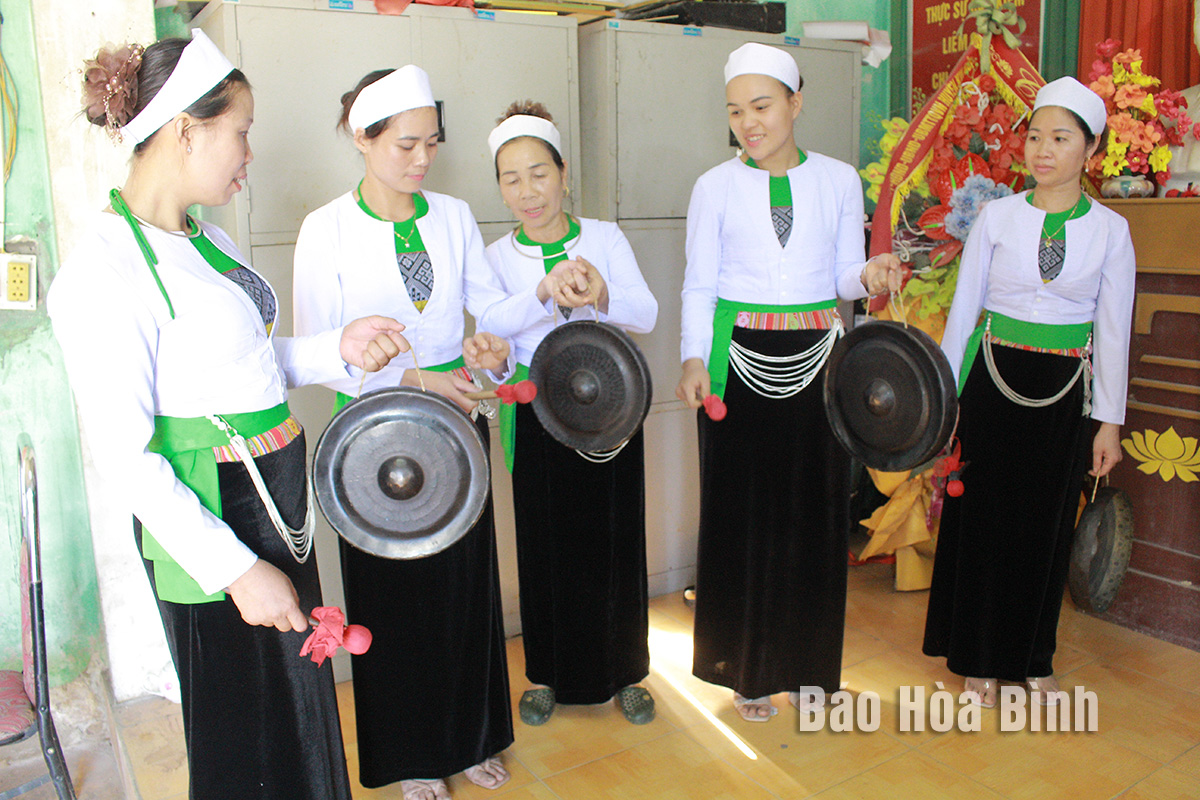

.jpg)

Members of the Trao village Muong gong club in Hop Tien commune, Kim Boi district regularly practice playing the Muong gongs.
The Trao village Muong gong club was established in June 2022 and has been operating regularly since September 2024. The club currently has 30 members, all of whom are women. The youngest member is 25 years old and the oldest is 65. All members share a strong passion for gong playing and a commitment to preserving the traditional cultural values of their ethnic group. Although the club initially faced numerous difficulties, the members supported and encouraged each other to overcome these challenges through their shared dedication to traditional culture.
Mrs. Quach Thi Van, Deputy Head of the Trao village Muong gong club stated: "The establishment of the club is of great significance. Through this platform, cultural practitioners have the opportunity to preserve and promote traditional values, eliminate outdated customs, curb social evils, and enrich spiritual life. It contributes to local socio-economic development and helps maintain security and order. To sustain our activities, the club’s executive board actively mobilizes support from the community, ensuring the effective preservation and promotion of the Muong ethnic group’s cultural identity.”
To maintain regular operations, the club holds practice sessions every Saturday and Sunday at the Trao village cultural house with a variety of activities. In addition, the commune provides partial financial support for the club to organize performances at festivals within and outside the district. Resources are also being mobilized to invest in the construction of cultural infrastructure and the purchase of equipment for village cultural houses, ensuring that clubs have adequate spaces for practice and performance. With the motto "The state and the people work together,” the efforts to preserve and promote traditional cultural values in the commune have yielded positive results. The commune has one Muong gong team, which owns four sets of gongs comprising 48 individual gongs. All club members have traditional Muong costumes for performances at festivals and competitions.
Mrs. Dinh Thi Huong, Head of the Women’s Union of Hop Tien Commune, shared: "Every year, the Party Committee and local authorities of the commune implement plans to preserve and promote the cultural identity of the Muong people. Communication and mobilization efforts are strengthened through conferences, meetings and integration with movements and campaigns in residential areas. The commune also directs hamlets to establish traditional cultural and artistic clubs. With the involvement of the entire political system, the cultural identity of the Muong people continues to be preserved and promoted.”
In the future, the commune will continue communication and mobilization efforts to raise awareness, particularly among the younger generation about the importance of preserving traditional cultural values and their responsibility to safeguard the cultural "treasures” of their ancestors.
Through these efforts, Hop Tien commune continues to preserve and promote the cultural identity of the Muong ethnic group while fostering local socio-economic development.
At the end of May, the Hoa Binh Provincial Ethnic Arts Troupe organized a series of performances for residents in Region 2 and Region 3 communes across the province. Bringing art to ethnic communities in remote, isolated, and especially disadvantaged areas has become a meaningful activity. These are not merely artistic performances but also journeys to disseminate cultural values, enrich spiritual life, and contribute to preserving the cultural identity of ethnic minorities.